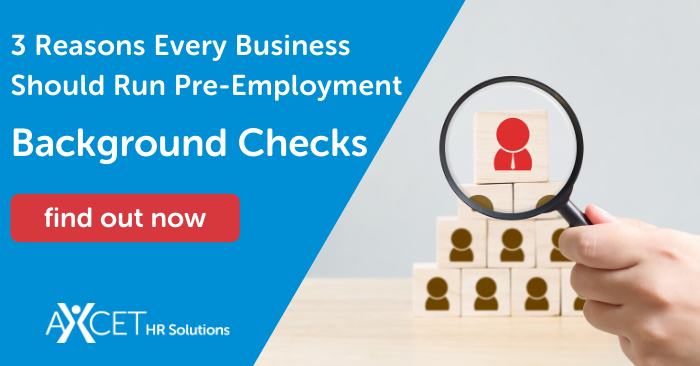
Conducting reference checks when hiring is a necessary step in the process to verify the accuracy of the information received during the interview process and provided on the candidate’s resume. According to SHRM, 92% of employers conduct some form of background check and usually as part of their pre-employment screening. Reference checks are valuable because they are often your first, and sometimes only, chance to learn about a candidate from another professional and/or outside source. That said, sometimes it can be difficult to get key individuals, specifically supervisors, to provide information beyond dates of employment and position held.
While employers may face distinct challenges when trying to obtain information from an applicant’s references, the potential to verify information, protect the organization and its employees, and avoid legal problems associated with poor hiring decisions makes it well worth the effort.

The Three Objectives of Employment Reference Checks
There are three main objectives behind conducting reference checks and when employers are able to meet these objectives, it enables them to hire the best candidates, avoid hiring disasters, reduce costs and increase productivity.
- Verify Truth of Applicant Statements. In an ideal world, reference checking would be unnecessary because employers would feel confident relying on all statements made by applicants in resumes, employment applications, and interviews. But in the real world, employers proceed at their own peril if they fail to confirm what applicants tell them. The magnitude of the deception that occurs during the hiring process is staggering. A CareerBuilder survey revealed 75% of Human Resources Managers have caught a lie on a resume.
- Prevent Problems Caused by Poor Hiring Decisions. Sound reference-checking practices can help organizations avoid two serious problems plaguing workplaces throughout the United States — workplace violence and employee theft. While employers should take a variety of steps to reduce the threat of workplace violence and losses due to theft, one of the most critical steps is to use pre-employment screening techniques that enable companies to reject individuals who are prone to violence or dishonesty. Moreover, by obtaining in-depth information about applicants' past job performance and work habits, employers are able to identify and reject individuals who are incompetent or have a history of discipline problems or chronic absenteeism. By ferreting out individuals who would be a poor fit for the job or the organization, employers can also reap rewards of increased productivity and reduced turnover.
- Reduce the Risk of Legal Liability. Employers run the risk of lawsuits for negligent hiring if they fail to exercise reasonable care in investigating an applicant's background, and as a result, hire an unsuitable individual who harms others in a way that was foreseeable based on that person's background. These lawsuits can be quite costly with the average negligent hiring settlement in exceeding $1.6 million, according to American Background Information Services, Inc., but even larger awards are possible.

Four Risks Associated with Employment Reference Checks
Whether you’re conducting a reference check or opting to skip the hiring practice, you can run into legal risks either way. Here are four risks to be aware of:
- Negligent hiring. This claim can be brought against an employer for negligent hiring, or retaining in its employ, an employee who the employer knew, or should have known, was unfit for the job, thereby creating a danger of harm to third persons. Plaintiffs in negligent hiring actions claim if the employer had properly examined an employee's background, the employee would not have been hired and the injury would not have occurred.
- Defamation. This claim arises where an employer, without being able to prove the truth of its statement, makes a statement to a third party which allegedly injures the employee's reputation and causes damage to the employee. Employers may find themselves in a Catch-22 situation. In trying to avoid defamation claims through a non-disclosure policy, a prospective employer who receives a positive reference from an employer in one instance, but silence from the another employer may interpret such a no-comment policy as a negative reference, thus laying the groundwork for the applicant to file a defamation suit.
- Negligent Referral. This claim has been brought against employers by other employers for their failure to disclose certain types of information. While employers do have limited protection through a legal theory known as "qualified privilege," this protection has only been applied to cases of defamation and has not stemmed the proliferation of litigation in this the hiring process. Under a protection of "qualified privilege," an employer's statements about a former or current employee must be truthful, made in good faith, and made for a legitimate purpose.
- Resume Fraud. The need for employers to have access to relevant job information is further underscored by the growth in resume fraud. According to Entrepreneur, up to 50% of all resumes and applications contain at least one fabrication.

Effective Reference Check Practices
Before conducting a reference check, always receive permission from the candidate. The smart practice is to ask all applicants to sign a release form. Once permission has been obtained, try to contact former supervisors, clients, and colleagues in the industry to get in-depth information about the quality or quantity of the candidate's work. The most informative references will be those given by former or current supervisors, who are likely to know the candidate’s work and who have observed the candidate performing a job that is similar to the one the candidate has applied for. Be aware when conducting reference checks, in some cities and states, inquiring about an applicant’s salary history is illegal.

Here are some sample questions to consider when conducting an employment reference check:
- What is/was your relationship with the candidate? And what is your job title?
- How long did you work with the candidate?
- What was the candidate‘s job title at your organization?
- What were the candidate’s dates of employment? (or ask to confirm the dates provided on the application or resume)
- What were the main job duties or responsibilities of the candidate’s position with your company?
- Did the candidate supervise others? If yes: If I spoke to those employees, how do you think they would describe his/her management style?
- What was the biggest project you are aware of that the candidate worked on for your organization? What was his/her responsibility for this project? Was the project successfully completed?
- How did the candidate deal with conflict?
- What are this candidate’s strengths?
- What are the areas this candidate can continue to improve?
- Did the employee have any warnings or discipline regarding unexcused attendance issues (frequent absences, tardiness, etc.)?
- What was the reason this candidate left your organization?
- Is the candidate eligible for rehire at this time?
Remember, when conducting reference checks best practice is to conduct one on every potential new hire and directly relate all questions to the position the applicant has applied for. The same discrimination laws that apply to interviewing may also apply to reference checking, so questions about protected classes (race, age, sex, etc.) are also off-limits when reference checking. Unfortunately, if you reach someone in HR when conducting a reference check, most likely they will only share dates employed and position title.

Let us know what you think...